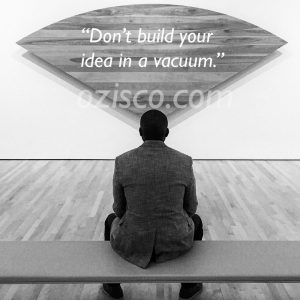 Multiple studies show that 90% of startups fail. As the co-founder of Moving Analytics, Ade Adesanya takes on this hard truth every day. He calls it “de-risking” his startup. He does this by having a laser focus on solving his customer’s problems while drawing inspiration from the impact his company is having on many lives. I met Ade during a talk about technology and entrepreneurship hosted by the Umu Igbo Unite chapter of Los Angeles. Ade was named a Forbes 30 under 30 and his company has raised $2M in VC funding. We invite you to get into the mind of Ade in this F.I.V.E questions feature:
Multiple studies show that 90% of startups fail. As the co-founder of Moving Analytics, Ade Adesanya takes on this hard truth every day. He calls it “de-risking” his startup. He does this by having a laser focus on solving his customer’s problems while drawing inspiration from the impact his company is having on many lives. I met Ade during a talk about technology and entrepreneurship hosted by the Umu Igbo Unite chapter of Los Angeles. Ade was named a Forbes 30 under 30 and his company has raised $2M in VC funding. We invite you to get into the mind of Ade in this F.I.V.E questions feature:
1. Briefly describe your background and how you got started.
I grew up in Lagos and came to US in 2007 to study Electrical Engineering at the University of Houston. I always had a passion for building things and caught the technology bug early in my college days. In my junior year in college, the Social Network movie detailing Mark Zuckerberg and Facebook’s story came out. The movie inspired me and my friends to find more problems in our community that technology could solve. We agreed to tackle a problem many college students battle with every semester, buying textbooks. We founded a company called Givepals to serve as a marketplace for students to trade textbooks with each other. The idea expanded to other items including, DJ services, cars, boats, and much more. At its peak, Givepals had over 3000 active users at UH; however, the company closed after we graduated and were unable to expand to other campuses due to engineering challenges.
The experience at Givepals inspired me to move to California and immerse myself in an environment where I could learn how to commercialize technologies and improve my project management skills. I enrolled in the Engineering Management program at University of Southern California (USC) and I also got a job at the USC’ Stevens Center for Innovation where I worked with researchers to commercialize their intellectual property into startup companies. Through my job at Stevens, I met my business partner Harsh, who was a postdoctoral fellow who had secured 2 patents for tracking and improving physical activity for chronic disease management. Harsh was looking to commercialize his patent into a commercial product and was looking for some business help in identifying a customer, fundraising and forming a team. Through our research which consisted of interviewing over 200 clinicians, hospital administrators, and non-profits like the American Health Association we discovered a business opportunity in the cardiac rehabilitation industry.
For those lucky to survive a heart attack, cardiac rehabilitation is a program designed to help patients improve their physical fitness, lower blood pressure and cholesterol, quit smoking, and improve other cardiovascular-related risk factors. Research shows patients who do rehab double their 5-year life expectancy and cut their risk of a second heart attack by up to 50%. The challenge is less than 15% of patients enroll in CR programs because there are very few programs which are located far away from people’s home and work. As a result, health systems are also shuttering their brick and mortar CR programs due to the high operating costs and unprofitability. This leads to more cardiac patients dying and getting readmitted within 12 months. Our team realized that there was an enormous opportunity in delivering cardiac rehab digitally through telehealth. This is how we founded the company, Moving Analytics.
2. Flashback and then fast forward to the present, what has surprised you the most about your journey (with Moving Analytics) thus far?
What has surprised me so far is the long sales cycles in healthcare. Our customers are large health systems. When you start, you have this conviction that since you have a solution to such a big problem, they would want to move fast to make something happen. That is unfortunately not the case since our sales cycle takes about a year, and could be longer for more complex agreements. It can be challenging at times because you still need to keep the business going while negotiations are progressing. Managing your expectations for the type of business you are in is important to your long-term success. Activities like the hundreds of demos we used to do when we first started that we thought weren’t working back then are now leading us to get more qualified leads and slowly chip away at the length of the sales cycle.
3. Why is the cause you are pursuing or problem you are solving the most important for this generation?
Cardiovascular disease is a leading cause of death. 1 in 10 people die from heart disease – more people die from heart disease than cancer. However, heart disease doesn’t get as much attention. Our platform and program help reduce the risk of dying from heart disease. As millennials, we live for experiences and want to continue to do that for a long time. If we can solve this problem, it means we would live longer and our parents would live longer. We would spend more time with our loved ones. The fact is there is a benefit to being healthy and there is a cost associated with it as well. Heart disease and heart failure are expensive diseases, and we are committed to fighting and preventing it with our platform.
4. Reflect on all of the key sacrifices and trade-offs you’ve had to make to get to where you are today. Which of these would you say was the most pivotal and why?
Running a startup is a huge commitment of your time, and personal relationships could suffer. We’ve been running the business for 4 years and in those 4 years, I’ve had some special personal relationships that didn’t work out. I’ve had to learn to manage my personal relationships better and realize it’s marathon, not a sprint. I’ve also started paying a lot of attention to my physical and mental health. When it comes to mental health, I try to share what’s going on in my life so my family and friends can help. It’s like you’re bringing them along on the journey.
5. What is the best piece of actionable advice you’ve received that continues to be a source of inspiration in good times and challenging times?
 “Don’t build your idea in a vacuum.” Get out of the building and get in front of your customers.
“Don’t build your idea in a vacuum.” Get out of the building and get in front of your customers.
A lot of people have ideas they want to hoard and not talk about for various reasons. The reality is most people do not care about your idea. Knowing this, I always try to socialize my ideas and in the process, I often determine what it is I need help with to take the idea to the next level. It’s interesting because when I share my ideas and where I need help, people would find ways to help me.
For more details, contact Moving Analytics.

